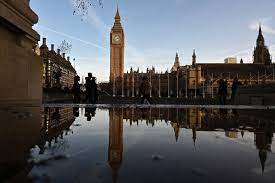LONDON (Agencies): The UK is to change its laws on modern slavery to prevent migrants from making spurious claims to avoid deportation.
Under the proposals, foreign criminals who spend more than a year in prison or are convicted of serious offenses will be deported, even if they claim to be victims of modern slavery, as will immigrants who make repeated false claims in order to be granted asylum.
The changes will also increase the threshold at which claims of modern slavery can be considered, which currently allows applications based on a “suspicion” of victimhood. In future, firm evidence, such as medical reports, will be required to support claims.
The Home Office received a record 17,000 cases of people claiming to be victims of modern slavery in 2022, up 33 percent on the previous 12 months.
In the same period, at least 45,728 people crossed the English Channel illegally in small boats.
The largest number of claimants came from Albania, with 4,659 alleged cases, or 27.5 percent of the total.
In a bid to deter spurious cases, the UK earlier this year signed an agreement with the government in Tirana that will allow people to be deported to Albania while their applications for asylum based on being victims of modern slavery are processed.
Currently only around 10 percent of applications for asylum made by Albanians claiming to be victims of modern slavery are rejected in the UK, but ministers believe that number will increase with the proposed changes to the law.
The UK government is also set to unveil a new bill next week that will automatically prevent people who enter the country illegally via the English Channel from claiming asylum.
Those who are caught doing so will be detained and deported to their home country or another safe country while their asylum application is processed.
The UK has already received 2,950 people via the English Channel this year, up from 1,484 in the same period in 2022. The largest number making the journey come from Afghanistan, followed by growing numbers from India.
As many as 85,000 people could attempt the journey this year, the Home Office believes.







